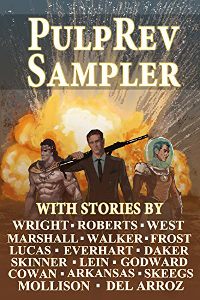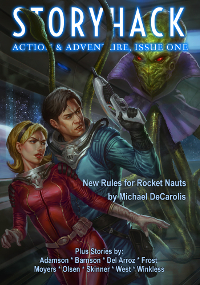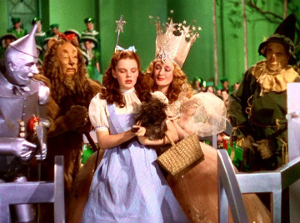No, Not That Kind of Pulp
Here's the Kind I Mean
Tuesday, November 21, 2017 10:53 am
Old pulp has a reputation as vulgar, trashy, lurid, and low; and in their apologetics, the proponents of new pulp are usually quite aware of that reputation.
Sometimes the apology is an outright apology. Some proponents, for example, explicitly disavow the "racism" and "misogyny" of old pulp. Well, okay. I'm not here to hate races or women, either. But declaring against "racism" and "misogyny" is a concession to the very Stalinist conformity that has been destroying our fiction. Those words are no longer reasonable; the enemy has defined them. These days, putting a woman in a dress and saying she is not the same thing as a man is considered "misogyny." Virtue signaling is not the path to better fiction.
Sometimes the apology is an outright apology. Some proponents, for example, explicitly disavow the "racism" and "misogyny" of old pulp. Well, okay. I'm not here to hate races or women, either. But declaring against "racism" and "misogyny" is a concession to the very Stalinist conformity that has been destroying our fiction. Those words are no longer reasonable; the enemy has defined them. These days, putting a woman in a dress and saying she is not the same thing as a man is considered "misogyny." Virtue signaling is not the path to better fiction.
Writing About Pluto
Get a Free Copy of Poof Poof Ya Does Me a Favor
Sunday, November 19, 2017 5:12 pm
Superversive Press is creating a series of anthologies, each of them focused on one of the nine planets in our system. I really like this idea and, when I heard about the series, immediately wanted to contribute.
Several anthologies, such as those for Mars and Venus, were already closed for submission. Luckily I wasn't left with only Uranus. Pluto was still available.
Several anthologies, such as those for Mars and Venus, were already closed for submission. Luckily I wasn't left with only Uranus. Pluto was still available.
Sample the Revolution

I took a very old, tiny idea that had never become the novel I imagined — "A king on the run refuses to abdicate" — and combined that with a little pulpy weirdness, and created The King's Portion.
You can get the sampler by buying it directly for all of 99 cents at Amazon or by signing up for the PulpRev mailing list (details here).
Go, now! Become enjoyified!
P.S. As with StoryHack, it was nice working with the PulpRev folks. If nothing else, the Pulp Revolution does not treat little-known authors with disdain!
And Give My Story a Read
Monday, October 30, 2017 8:40 am

I took a very old, tiny idea that had never become the novel I imagined — "A king on the run refuses to abdicate" — and combined that with a little pulpy weirdness, and created The King's Portion.
You can get the sampler by buying it directly for all of 99 cents at Amazon or by signing up for the PulpRev mailing list (details here).
Go, now! Become enjoyified!
P.S. As with StoryHack, it was nice working with the PulpRev folks. If nothing else, the Pulp Revolution does not treat little-known authors with disdain!
Why the Pulp Attitude Has Attracted Me
On Becoming a Fellow Traveler
Tuesday, September 26, 2017 10:09 am
You can be shaped by what you will not do. I will not drink. I will not curse. I will not lose my temper. Exclude the vices and you become other than vicious.
But “other than” is not enough. The bad is a privation of the good; but the good is not a privation of the bad. You must also be shaped by what you do. Include the virtues and you become virtuous.
We all know science fiction has become vicious. It is a platform for despising God, truth, men, women, and civilization. It gathers the mentally disordered and celebrates their diverse disorders. I just want to read about the defeat of killer robots and instead I must read about six-way sex on the planet Luvwyns.
But “other than” is not enough. The bad is a privation of the good; but the good is not a privation of the bad. You must also be shaped by what you do. Include the virtues and you become virtuous.
We all know science fiction has become vicious. It is a platform for despising God, truth, men, women, and civilization. It gathers the mentally disordered and celebrates their diverse disorders. I just want to read about the defeat of killer robots and instead I must read about six-way sex on the planet Luvwyns.
StoryHack #1 Is Out

Anyhow, StoryHack #1 is out. Buy it on Amazon (to give the publisher money). Review it on Amazon (to increase its rank). Read my story Some Things Missing From Her Profile and be amazed by my superlativiosity. Go, now!
P.S. It's awesome to be in the inaugural issue. Yes, there was a proof-of-concept issue #0, but being in #1 feels nice.
Read My Story in It!
Tuesday, September 26, 2017 9:45 am

Anyhow, StoryHack #1 is out. Buy it on Amazon (to give the publisher money). Review it on Amazon (to increase its rank). Read my story Some Things Missing From Her Profile and be amazed by my superlativiosity. Go, now!
P.S. It's awesome to be in the inaugural issue. Yes, there was a proof-of-concept issue #0, but being in #1 feels nice.
The Rot Is Deep
It's All So Casual Now
Sunday, September 17, 2017 9:03 pm
So, on Netflix, I'm watching The Blacklist, that show starring James Spader. Generally it's just cool and outrageous. Like most modern TV, though, it can't merely deliver its clever plot but must also deliver an Approved Point of View.
It is particularly annoying when Reddington, an amoral killer, goes on some dogmatic rant about, oh, religious intolerance of sodomy. The writers, in their own real lives, hate (or at least must seem to hate) such intolerance, and so they can't help but depict their "hero" as doing the same — even if it makes him, at least briefly, a mouthpiece instead of a person.
Sadly, though, I experienced a more dispiriting moment in the show. Dogmatic rants at least indicate the writers are aware that they are taking positions. What happens when the rot is utterly unconscious?
It is particularly annoying when Reddington, an amoral killer, goes on some dogmatic rant about, oh, religious intolerance of sodomy. The writers, in their own real lives, hate (or at least must seem to hate) such intolerance, and so they can't help but depict their "hero" as doing the same — even if it makes him, at least briefly, a mouthpiece instead of a person.
Sadly, though, I experienced a more dispiriting moment in the show. Dogmatic rants at least indicate the writers are aware that they are taking positions. What happens when the rot is utterly unconscious?
That's Where You'll Find Me
 There's a misalignment in The Wizard of Oz.
There's a misalignment in The Wizard of Oz.
What is its moral? "There's no place like home." Dorothy has found herself in a land over the rainbow, and yet her ultimate desire — the fulfillment of which she asks of the Wizard — is to return to Kansas. Near the end, Glinda prompts Dorothy to articulate the lesson that she, Dorothy, has learned; and Dorothy replies:
Maybe Dorothy Sings About the Wrong Thing
Saturday, August 12, 2017 12:19 pm

What is its moral? "There's no place like home." Dorothy has found herself in a land over the rainbow, and yet her ultimate desire — the fulfillment of which she asks of the Wizard — is to return to Kansas. Near the end, Glinda prompts Dorothy to articulate the lesson that she, Dorothy, has learned; and Dorothy replies:
If I ever go looking for my heart's desire, I won't look any futher than my own backyard. Because if it's not there I never lost it to begin with.This lesson, of course, accords with the narrative facts that the Scarecrow, the Tin Man, and the Cowardly Lion each already had the thing he sought. The Scarecrow was already brainy; the Tin Man, full of heart; the Lion, courageous. And Dorothy, in Kansas, already had the place most free of trouble: her home with Aunt Em and Uncle Henry.
© 2004-25 David Skinner · All rights reserved